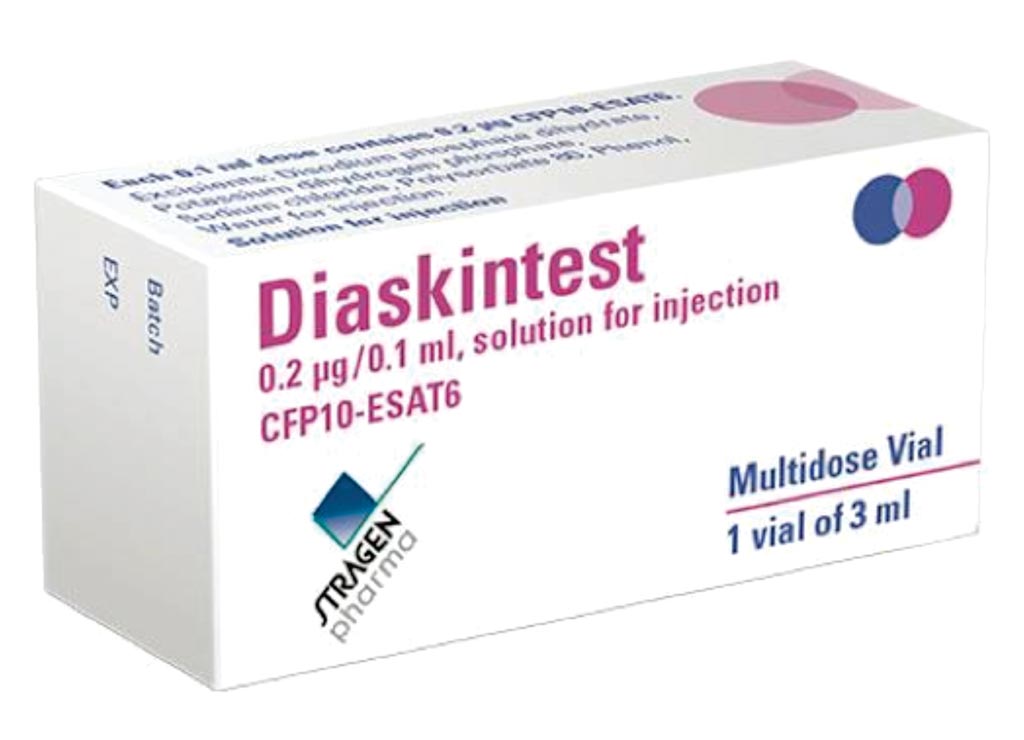Commercial TB Test Compared to Recombinant Allergen Skin Test
By LabMedica International staff writers
Posted on 27 Sep 2019
Tuberculosis (TB) is one of the top 10 causes of death worldwide and the primary cause of death due to any single infectious agent. In 2017, approximately 10 million people developed TB, and 1.3 million died from the disease.Posted on 27 Sep 2019
Currently, two methods are used for the detection of latent tuberculosis infection (LTBI), the tuberculin skin test (TST) and interferon-gamma release assays (IGRAs). The TST measures a complex delayed-type hypersensitivity reaction to purified protein derivative (PPD).

Image: Diaskintest is an innovative skin test for the mass screening of tuberculosis (Photo courtesy of Stragen Pharma).
Scientists at the Central Tuberculosis Research Institute (Moscow, Russia) included in their study 85 adults (median age 42 years, range 18–84 years; 48 women, 37 men) and 96 children (median age 10 years, range 3–16 years; 49 girls, 47 boys). The TB diagnosis was made by clinicians based on the results of the following: microbiological examination (sputum smear, culture/BACTEC, and/or PCR analysis) of respiratory specimens (sputum, bronchoalveolar lavage (BAL), bronchial washing, nasopharyngeal aspirates), surgical material, and/or pleural effusion; conventional chest X-ray and/or CT; clinical examination (anamnesis, complaints, history of TB exposure).
The team compared the performances of Diaskintest and QuantiFERON-TB Gold in adults and children with suspected TB in Moscow, Russia. Diaskintest, a recombinant allergen skin test, was injected intradermally at a dose of 0.2 μg/0.1 mL by an experienced nurse. The induration was measured 48–72 hours later by an experienced clinician unaware of the results of the QFT. The presence of infiltration of any size was considered as positive.
The scientists reported that Diaskintest and QFT were concordant in 84% of adults and 90% of children (overall concordance 87%). The concordance between QFT, Diaskintest, and the final diagnosis was good in adults (86% and 81%, respectively) and moderate in children (77% and 79%, respectively). In adults, QFT had a higher sensitivity for detecting TB than Diaskintest (82% and 68%, respectively); in children, Diaskintest was more sensitive (73% and 65%, respectively). In patients with a confirmed TB diagnosis, negative Diaskintest/QFT results were associated with low disease activity. Combined Diaskintest/QFT results identified TB patients with higher sensitivity and specificity than each test separately.
The authors concluded that the Diaskintest and QFT demonstrated good concordance. Provided that there are no contraindications to the use of the tests in vivo, the Diaskintest can be recommended as a low cost TB infection screening test in countries with a low/medium per capita income. The Diaskintest and QFT showed quite high specificity and an optimal sensitivity, which depended on the TB process activity. The combined use of the two immunological tests will allow the sensitivity of TB immunodiagnosis to be increased. The study was published in the September 2019 issue on the International Journal of Infectious Diseases.
Related Links:
Central Tuberculosis Research Institute










 Analyzer.jpg)



